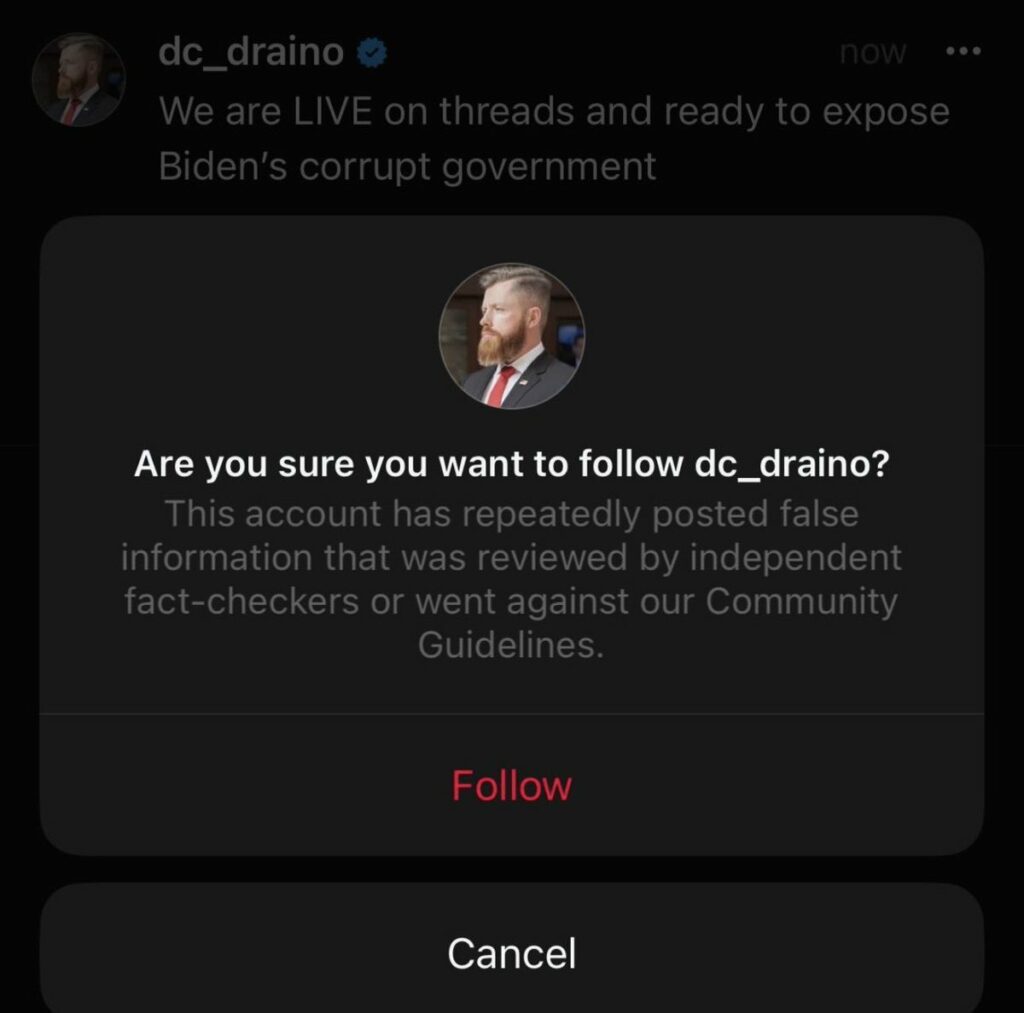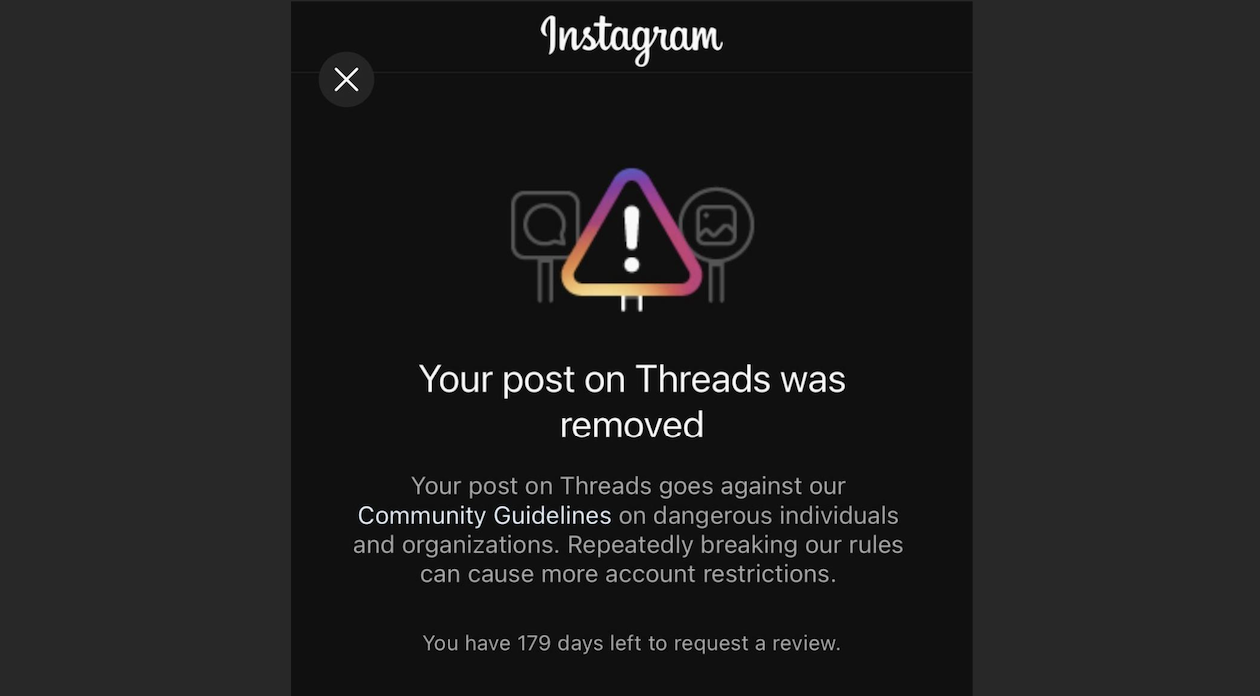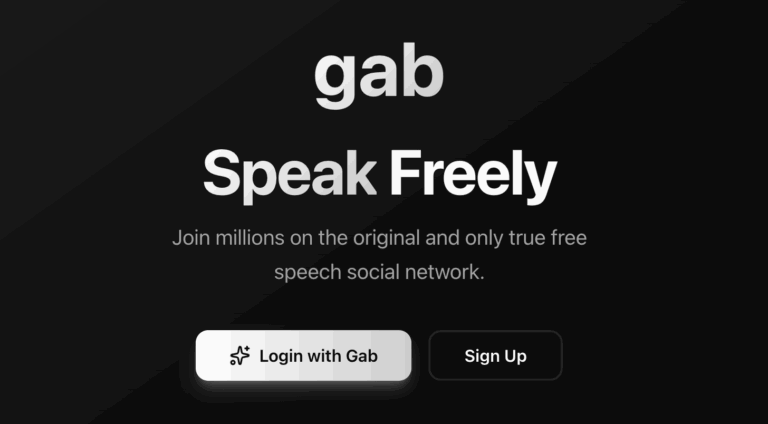This week Meta-owned Instagram launched Threads, a Twitter competitor, aiming to diversify its services. In a surprise to no one, Threads immediately started censoring and putting warning labels on the accounts of conservative users. The launch of Threads raises important questions about the Meta’s control over information, evident through early censorship of conservative users, and also about the role of alternative platforms like Gab.com in countering the dominance of big tech oligarchs.
Meta’s unrivaled control over the dissemination of information is a subject of significant debate. The platform’s algorithms, which are designed to curate content based on user preferences, inadvertently create echo chambers and information silos. This is in contrast to platforms like Gab which offer a chronological feed displaying the latest posts allowing you to discover a wide variety of conversations on the platform as they occur thanks to Gab’s free speech policies.
By reinforcing users’ existing beliefs, Facebook, Instagram, and now Threads can mold the reality people experience online, dictating what they see and shielding them from dissenting views. This power is further amplified when Facebook collaborates with governments and activist groups which enables information manipulation and censorship of citizens on behalf of governments. Thankfully a judge ruled this week that this very clear violation of the First Amendment in America needs to end.
With the launch of Threads, Facebook aims to compete with Twitter and tap into new user demographics. The early signs of censorship against conservative users within the first 24 hours of Threads’ release is cause for concern. The swift suppression of conservative voices reinforces worries about Facebook’s control over what is deemed “acceptable speech.” This incident raises questions about the platform’s commitment to fostering open dialogue.
“The goal is to keep it friendly as it expands. I think it’s possible and will ultimately be the key to its success,” wrote Zuckerberg in a Wednesday post. If the goal is to keep it “friendly” that means removing anything that could be deemed “unfriendly” to various groups of people.
In practice, that looks like shutting conservatives up to appease fragile liberal feelings. Zuckerberg wants to mirror Instagram’s fake and illusory experience into the product of Threads, painting the picture of a world that is only “friendly” ponies and rainbows. That’s not how the real world works and there’s nothing beneficial to society about a platform that hides the truth from its users to protect their feelings and keep them in an imaginary world of illusion.

The emergence of platforms like Gab offer an alternative narrative to the status quo dominated by Facebook and other big tech giants. Gab positions itself as a platform that exists outside the control of these oligarchs, promising to provide users with a space for free speech. For those who feel marginalized or silenced within Facebook’s walled garden Gab serves as a sanctuary where they can share ideas, opinions, and perspectives that may not align with mainstream narrative.
Gab’s unique role in providing a space for people to access information and news that is often absent from mainstream platforms is of increasing importance. The social media landscape, controlled largely by a handful of influential entities, has the power to shape public opinion and control the narrative surrounding important issues. Alternative platforms like Gab challenge this dominance by allowing individuals to seek out alternative sources of news and information. This diverse range of perspectives enables users to critically analyze mainstream narratives, encouraging a healthy skepticism and a deeper understanding of complex societal matters.
One of Gab’s defining features is its commitment to upholding freedom of speech. While this commitment has sparked debates and controversies, it also plays a vital role in enabling individuals to express themselves without fear of censorship or retribution. Big tech platforms, influenced by various factors such as political pressures or corporate interests, engage in heavy-handed content moderation that limits the scope of discourse. This is by design. Those in power don’t want you thinking outside of their failed egalitarian globohomo liberal worldview. Gab, as a platform that values unrestricted speech, allows marginalized voices to be heard and provides a space for “unpopular opinions.”
Gab’s role as an alternative platform offering access to information and news not found on mainstream big tech platforms should not be underestimated. It provides an escape from the echo chamber, challenges media narratives, upholds freedom of speech, and encourages healthy debate and critical thinking.
Facebook’s new Twitter competitor, Threads, enters the social media arena amidst concerns about the company’s control over the flow of information and news online. The early censorship of conservative users within the platform’s first 24 hours highlights the potential pitfalls of entrusting a single entity with such immense power. It underscores the importance of alternative platforms like Gab, which strive to exist outside the influence of big tech oligarchs, providing users with an outlet for expression and diverse perspectives. Fostering a balanced information ecosystem that upholds free speech will be crucial for creating a healthier online space for everyone and that’s what we intend to do here at Gab.
Andrew Torba
CEO, Gab.com
Jesus is King
Invest and become a shareholder in Gab! Gab is currently selling shares in its business in a Regulation Crowdfunding investment round conducted pursuant to Section 4(a)(6) of the Securities Act of 1933. Click here to be directed to the crowdfunding portal to learn more about the offering.






